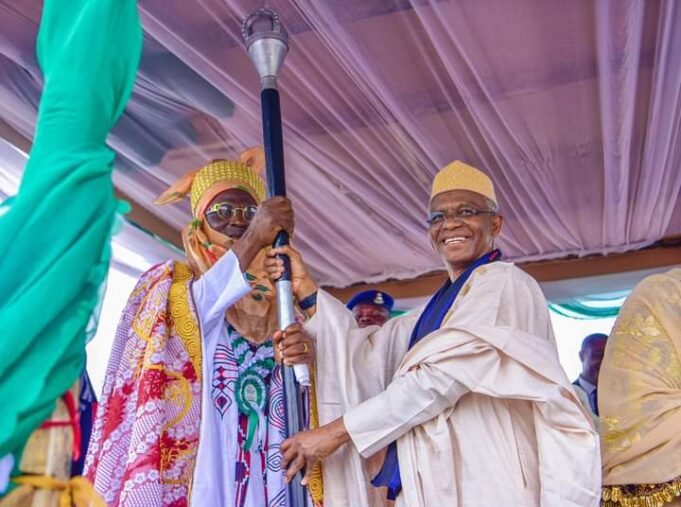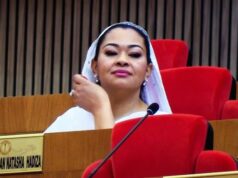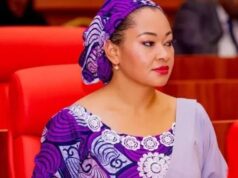BY BULUS GODWIN
From a body which had executive, legislative and judicial powers in the pre-colonial era, the traditional institution has witnessed a lot of transformation from independence till date. But it has survived colonial rule, the first republic, several military regimes and an interim government, including the present dispensation.
In Kaduna State, the traditional institution has undergone a complete metamorphosis but the Governor Nasir El-Rufai administration has given it a new lease of life.
As soon as the governor was sworn in on 29th May, 2015, he discovered that some local governments were unable to pay salaries. The salaries and upkeep of traditional rulers and their paraphernalia of office were a drain on the purse of the Area Councils. The governor then constituted a five-man committee with Malam Ibrahim Sambo as chairman. The committee was mandated to come up with the actual number of District and Village Heads in the state. The committee recommended that the number of District Heads be reduced from 390 to 77 and the 5,882 Village Heads should be reduced to 1,429. Governor El Rufai approved the recommendation.
Furthermore, the governor set up a committee to review the Chieftaincy Law of Kaduna State. The committee received inputs on the desired nomenclature of some emirates and chiefdoms, recommendations to restore the lost glory of the traditional institution as well as reaffirm the identity of the people. The committee advised that the names of emirates and chiefdoms should bear the names of geographical features like mountains, rivers, soil, etc. or bear the names of their ancestral towns, instead of names of ethnic groups or tribes.
For example, the Committee proposed that Atyap Chiefdom should be renamed Zangon Kataf Chiefdom which was agreed on. Likewise, from Ikulu Chiefdom, the chiefdom was rechristened Kamuru Chiefdom in Zangon Kataf local government and Kurama Chiefdom has been changed to Kudaru Chiefdom in Lere local government. Another feature of the reform is that ethnic groups that cut across two or more local governments, will pay allegiance to the one that they are domiciled in. For example, there are Adara people in both Kajuru and Kachia local governments. So, in the reform, the Adara can only pay allegiance to the paramount ruler in each of the two local governments. That means the Chief of Kachia is the paramount ruler of all tribes in Kachia local government, including the Adara ethnic group. Similarly, the reform saw the creation of new Chiefdoms, especially Kufana Chiefdom out of the old Adara Chiefdom, Dnata Chiedom out of Jere Emirate, Arak out of Gwantu Chiefdom.
Significantly, the reforms has enhanced service delivery as traditional rulers are now engaged in monitoring, supporting and supervising government projects and programmes. For example, they play key roles in security matters as each traditional head is part of the security committee of his local government. In this regard, review meetings are observed once every week. The agitation for ethnic identity has subsided as there is one single paramount ruler in a local government which has authority over all tribes. Above all, traditional rulers receive salaries as and when due because their number has been trimmed and owing to the reforms, local governments now have resources to cater for their upkeep.

Specifically, there are now six First Class Emirs and Chiefs in Kaduna state, including His Highness, Malam Ahmad Nuhu Bamalli, Emir of Zazzau, His Highness, Mr. Ufuwai Bonet, His Highness, Alhaji Muhammadu Isa Muhammadu, the Emir of Jema’a, His Highness, Malam Zubair Jibril Maigwari II, Emir of Birnin Gwari, His Highness, Malam Tagwai Sambo Chief of Moro’a, His Highness Dr. Danladi Gyet Maude, Kpop Ham. Likewise, there are now 13 Second Class Chiefs namely; His Highness Mr. Dominic Gambo Yahaya, Agwam Zangon Kataf, His Highness Mr. Luka Kogi Yabuwat, Agwam Kajju Traditional Council, His Highness Mr. Paul Zakka Wyom, Kpop Fadan Kagoma, His Highness, Mr. Ishaku Yari, Esu Chikun, His Highness, Balarbe Abdullahi Karma, Chief of Gwantu, His Highness, Engr. Suleiman Umar Lere, the Emir of Lere; His Highness, Alh. Alhassan Adamu, Emir Kajuru, His Highness, Alh. Sa’ad Abubakar, Emir of Kagarko, His Highness, Mr. Yohana Akaito, Ere- Kubacha, His Highness, Alhaji Abullahi Daniya, Emir of Jere, His Highness, Alh. Umar Musa, Uchu Ninzo, His Highness, Alh. Musa Muhammad Sani, Sarki Saminaka.
In addition, there are 16 Third Class Chiefs and they include His Highness, Mr. Zamani Dogonyaro, Chief of Kachia, His Highness, Brig.-Gen. Iliya Aliyu Yamma(Rtd), Chief of Arak, His Highness, Alh. Dauda Abdullasalam Abdullahi, Pukgom Kunama 11, His Highness, Rev. (Dr) Habila Sa’idu, Chief of Godogodo, His Highness, Mr. Tanko Tete, Tum – Kaninkon, His Highness, Dr.Kantiok Josiah Tagwai, Agwam Zikpak, His Highness, Alh. Yahaya Mohammad, Res- Fadan Chawai, His Highness, Mr. Yakubu Iliya Sauri, Bugwam Kudaru, His Highness, Mr. Jonathan P. Zamuna, Pukarma Piriga, His Highness, Mr Yohanna Sidi Kukah, Agwom Kamuru, His Highness, Mr. Tobias Nkom Wada, Agwam Afan Takad, His Highness, Mr. Daniel Lemson Njibe, Barde Traditional Council, His Highness, Ibrahim Ayu Halidu, Agwom Fadan Ayu, His Highness, Mr. Alkali, Ngbiar Fadan Kamantan, His Highness, Titus Dauda, Agwom Kufana and His Highness, Bitrus James, Chief of Dnata.
Indeed, the reduction in the number of District and Village Heads, coupled with the creation of new Chiefdoms, which are the pivots of the reforms, have elevated the status of traditional rulers in Kaduna state and have met the yearnings of various tribes.
*Godwin is a staffer of the Public Affairs Department of Kaduna State Government.
- King who died inside the honey pot, by FUNKE EGBEMODE - April 2, 2025
- Tinubu appoints Bayo Ojulari, Shell ex-MD, as NNPC GCEO - April 2, 2025
- Fidelity Bank records N385.2bn profit, investors to get N2.10 dividend - March 31, 2025








